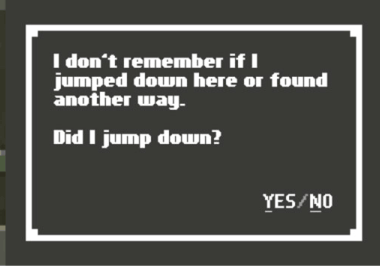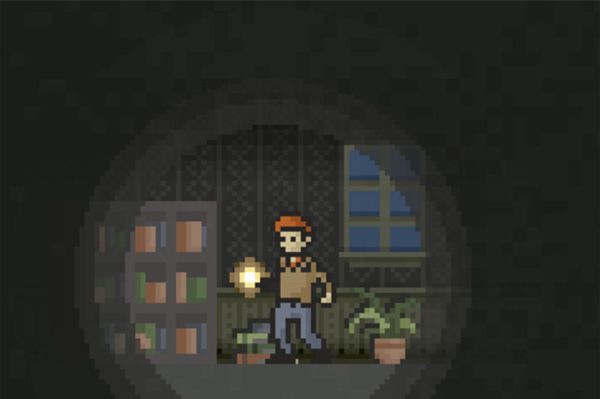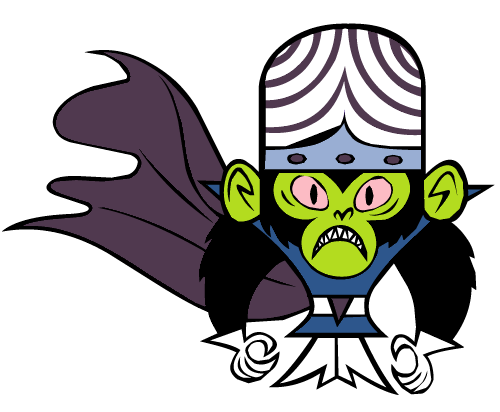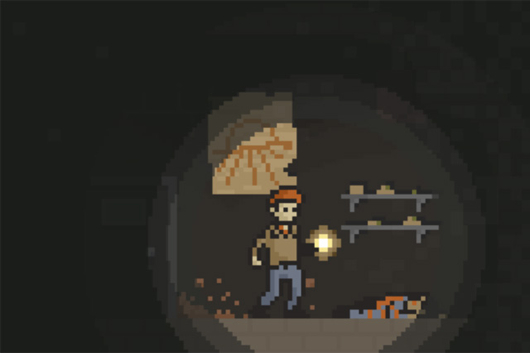When I first booted up Home on Steam, I expected to be drawing a lot of comparisons to Lone Survivor, another 2D horror game that I already raved about. However, while Lone Survivor is a 16-Bit Silent Hill, Home has more in common with the last game I reviewed, Dear Esther. (I recommend you at least skim that before reading this one, since I reference it quite often.) As an indie horror game, Home builds atmosphere and creates a spooky experience, but shies away from traditional gameplay elements in a way that may turn off many gamers.
Home is a short game, meant to be completed in a single sitting (I clocked in at 66 minutes.) There are opportunities to change your path and make different decisions throughout, theoretically leading down a different road, but I'll get to that later. It is primarily narrative driven, putting the player right smack in the middle of a murder mystery.
Before I get too far into this, let me just say that I found the game, at least the beginning, to be genuinely scary. I believe a big reason for this may be because I bought the game on a whim and had virtually no idea what to expect. Venturing into the unknown was probably the most interesting part of Home, and while I won't put in any spoilers, keep in mind that knowing even a little bit about the story may lessen the suspense.

As a nameless protagonist, you wake up in a strange house somewhere in the neighborhood with no idea how you got there. Also, there is a dead body of somebody you've never met before collapsed on the ground nearby. As you explore the house and the surrounding area, it soon becomes apparent that there is a deranged serial killer on the loose. Worse yet, whoever (or whatever) is responsible may have some kind of connection with your own loved ones. Facing blocked exits and mounting desperation, you must navigate through secret tunnels and spooky forests to get back home to your wife before it's too late, and hopefully get some answers along the way.
I said before that Home bears a closer resemblance to Dear Esther than Lone Survivor. I mean this from a gameplay perspective. When it comes to presentation, Home and Dear Esther could not be more different. Home goes for a 2D pixel look, not quite as gritty and detailed as Lone Survivor, but along the same lines as something from the NES or SNES days. For the most part, it looks pretty good. The design captures the feel of earlier generation graphics quite well, and as somebody who goes gaga over the retro look, Home's visuals make me squee. The only think that bothered me was the noiceable lack of variation in the human sprites. You get your character, and everyone else. That's it. This does not detract from the game, in my opinion, I just wish the designer would have thrown in a couple more people models.
The reason I say Home is like Dear Esther is because it is an tried-and-true indie art game with a focus on exploration. Yeah, it's one of those games. That took me completely by surprise. When I played Dear Esther, I knew exactly what I was getting into. With Home being billed as a horror game, I expected much more interaction. You control your character walking around in a 2D space. You walk left and right and look at stuff. Occasionally you get a piece of narration to expound on the details of the plot. Since Home is going for a retro vibe, these narrations are in the form of text like the dialogue cards in a silent film instead of voiceover work by some English guy. Still, it's very much the same deal as Dear Esther.

For what it's worth, Home does get a little gamier than Dear Esther. For starters, you actually interact with stuff. As you walk along, objects of interest will highlight and you push a button to check them. There isn't much to this, though. There is no inventory, very little problem solving, and no way to "fight." Interacting with an object just brings up text. In other words, it's just a way to manually trigger the narration instead of having it pop up at random.
Occasionally you come to an obstacle that needs to be passed, and you can pick up items as well. Like I said, there is no inventory, so picking something up consists of getting a text box that tells you that you picked it up. When you use it, the text tells you that you used it. That's it. Home also throws a couple sections that I hesitate to call "puzzles," since all you have to do is hit a couple switches to unlock a door. These switches are right out in the open and impossible to miss, so the only real substance to these sections is making you explore the area a little more before you move on. (Don't think of it as padding, though, because you actually find some interesting stuff during these parts.)
If this sounds like I'm bashing the game, I'm not. I do have a pretty major complaint against it, but I'll get to that in a minute. Although the gameplay may be sparse compared to what I was expecting, Home (mostly) accomplishes what it sets out to do. The experience is genuinely spooky. Going into the game without knowing what it was, I found myself just as confused as the protagonist. I was piecing together the clues in real life just as much in game.
The characters, what little screentime they have, are also developed so well, fully, and subtly that I cared about them and their fates. It wasn't just the protagonist who wanted to get home to his wife. When I found out she might be involved in this fiasco, I was legitimately worried and desparate to get to her. It also does a great job building fear.

Imagine in real-life, waking up in a strange place as the only living thing amongst a pile of dead bodies and being forced to detour through creepy woods and an abandoned factory to get out, and realizing that a deranged murderer might be stalking your family. That would be terrifying. Despite (or maybe because of) its minimalist style, Home is astonishingly immersive. It sends chills down your spine every time you find a fresh corpse and start to wonder if somebody might be waiting to jump at you from the shadows. The atmosphere for most the game is excellent.
Another aspect I need to give credit to is the sound design. There is no music other than the opening/ending theme. All the game is made completely of environmental sound effects. Crickets in the woods, for example, or the clanging of machinery. It is all crystal clear, as high quality as if you were actually there, which further helps to suck you into the experience. If you do give this a try, you will be doing yourself a disservice if you play it without a good pair of headphones. Any jump scares in the game come from the sound, while still being natural to the environment, which is another testament to how well of a job the designer did in bringing out a true horror atmosphere.
Home is a great piece of interactive horror/mystery fiction for the first nine-tenths of the experience. Unfortunately, the most unsettling thing to jump at you from the unknown is the ending, which is the huge flaw with the game that I mentioned before. This is hard to talk about without spoiling anything, but that's just the thing: there isn't much to spoil. For all of the expertly crafted build-up and suspense, Home has one of the weakest endings I've seen from a game in a long time.

The above picture is completely unrelated.
The flaw comes from both what happens, and the way it's presented. I won't spoil the former, but let's just say that it's vague and potentially cliched. It's given to the player in the same text boxes that you see for the rest of the game, as a sort of epilogue that pops up out of the blue as you enter the final door. It is an anticlimax at it's worst. With the way the game builds tension, it would have been great to end the game with a cutscene, with dialogue, or with an actual action sequence. Instead, the payoff for the great characterization and mounting suspense is a long-winded, purple-prose filled text box like the endings in the old Mortal Kombat games. Except worse, because they gave closure and had artwork to go with them.
For what it's worth, it is possible to "change" the ending by small decisions you make through the game, such as deciding whether to pick up a murder weapon or close the eyes of a dead body. These choices don't effect the path of the game, just the text, so the only real impact they have on the ending is the phrasing. In the case of Home, whether the text vaguely implies one cliche ending or vaguely implies a different cliche ending doesn't change the fact that it's just a vaguely worded implication of a cliche.
The reason this type of ending works in a game like Dear Esther is because Dear Esther itself is arts and vague all the way through. You may not like indie art games like these, and that's completely understandable, but at least Dear Esther didn't try to hide what it was. The entire game is like exploring a personified metaphor. The ambiguity comes with the territory. Home is not like that. It's a literal murder mystery all the way through. There is no philosophical, human-condition analysis until the very end. It is a cut-and-dry suspense mystery, and the ending leaves us hanging in a way that has no business being in something that is otherwise so straightforward. It's like reading a Sherlock Holmes story, but when Watson asks Sherlock how he figured it out, Holmes recites poetry and goes to bed.
I have no problem with vague, open-to-interpretation endings. In fact, in the right context, they can be awesome. It's just that Home is not the right context. To compare it to some more well known horror games, imagine playing through Resident Evil. Exploring the mansion, rescuing your comrades, dodging the undead, etc. Then, when confronting Wesker in the lab at the end, instead of releasing the Tyrant, he explains to Chris that the mansion is actually purgatory and the zombies are the manifestations of his guilt over murdering Rebecca years before. That ending works in Silent Hill because the story in Silent Hill is all about psychology and exploring the gray areas of human morality. Although there is combat in both games, and Resident Evil does have it's moments ("itchy tasty" still give me chills,) the scenario I just described would never work in Resident Evil. Silent Hill has depth, symbolism, and surrealism. Resident Evil has, "don't let mutants eat your face."

Now that was quite a rant, and I apologize. Despite all the negative I felt about the ending, my opinion on the meat of the game remains the same. It still does a great job of putting the player in the shoes of an everyman with no idea what's going on, and it still captures terror and suspense of a being part of a murder mystery. Overall, Home is like going to a restaurant and having great food, but getting stiffed on the bill. As much as that last part sucks, it doesn't change the fact that everything leading up to that was great.
On Steam, Home is three dollars and can be beaten in about an hour. That is half the price and half length of the last movie I saw in the theater. Drawing on that analogy, Home's worth is a question of how you would feel about paying for a movie that you've been told is awesome but you know has a terrible ending. Is the lackluster conclusion enough to ruin the whole experience? That is something you will have to ask yourself when deciding to purchase Home.
you are invited to follow my blog
ReplyDelete